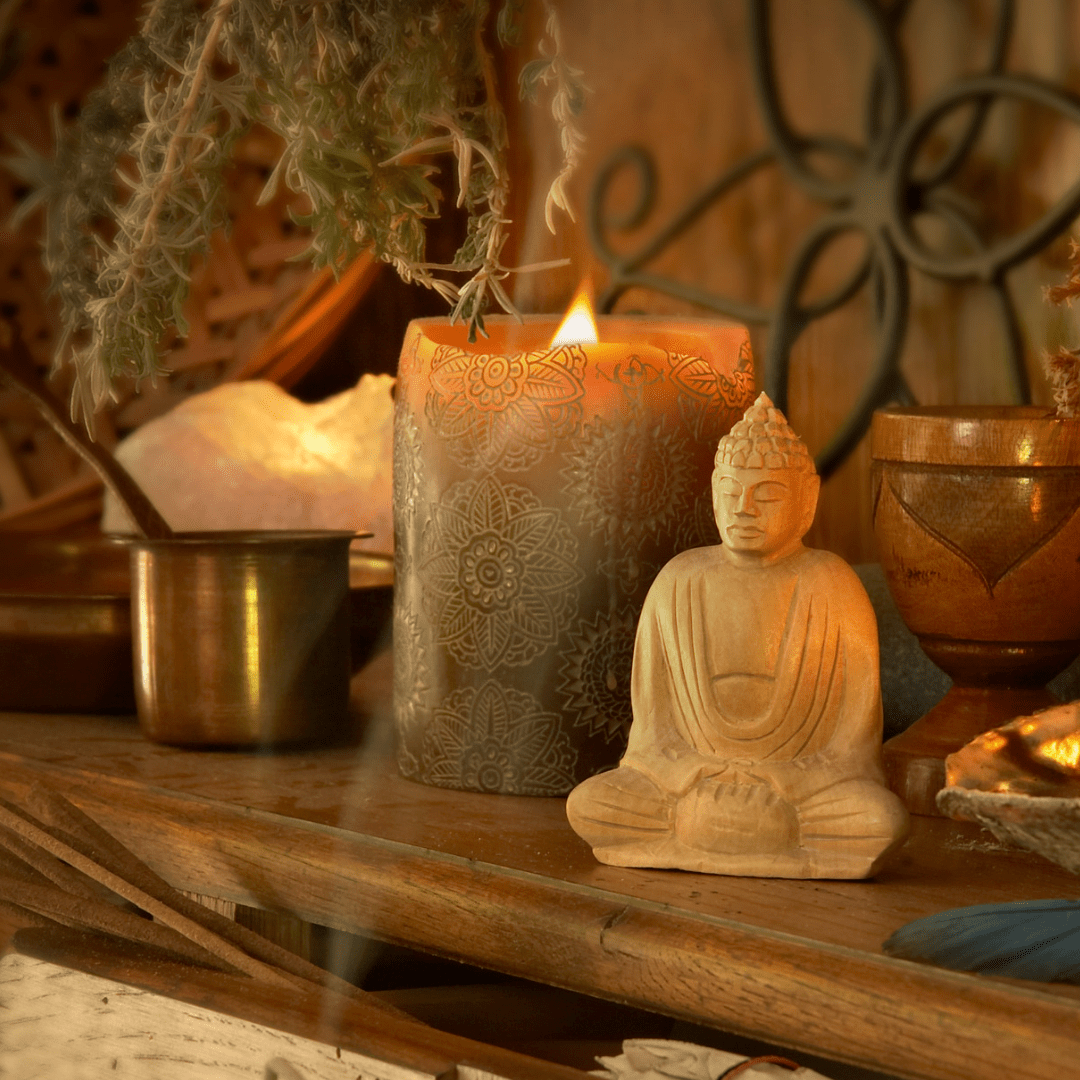Meditation has long been a spiritual practice dating back thousands of years, and its ability to provide spiritual growth is still widely recognized today. In this article, we’ll be exploring how meditation can help us uncover the secrets of our inner being, allowing us to grow spiritually in ways that may have previously been inaccessible. We’ll cover what spiritual growth through meditation entails, the benefits associated with the practice, and tips for starting your journey toward self-discovery and enlightenment.
Introduction
Meditation is a powerful tool that can aid in spiritual growth, enabling individuals to connect with their inner selves and achieve a greater sense of clarity and purpose. Spiritual growth involves cultivating a deeper understanding of oneself and the world around them, and it can lead to a more fulfilling and meaningful life. In this article, we will explore the secrets to spiritual growth through meditation, providing insights and tips for those seeking to enhance their meditation practice and deepen their spiritual development.
From setting intentions to cultivating mindfulness and gratitude, we will uncover the key elements of a successful meditation practice that can help you achieve spiritual growth and a greater sense of inner peace. So whether you’re new to meditation or seeking to refine your practice, read on to discover the transformative power of meditation in your spiritual journey.
How Meditation Can Help with Spiritual Growth
Meditation is a powerful tool that can help with spiritual growth. People have practiced it for centuries, and it remains relevant today. In this fast-paced world, we can easily get caught up in the hustle and bustle of everyday life, leaving little time for self-reflection and spiritual development. However, meditation offers an escape from chaos and provides a way to connect with ourselves on a deeper level.
By practicing meditation regularly, we can become more mindful of our thoughts and emotions. This awareness allows us to identify negative patterns that may be holding us back from experiencing true spiritual growth. Through consistent practice, we can develop greater clarity of mind and cultivate a sense of inner peace that transcends external circumstances.
Furthermore, meditation can help us connect with something greater than ourselves – whether it be a higher power or simply the interconnectedness of all things.
What is Spiritual Growth and Why is it Important?
The concept of spiritual growth can be defined as the process of developing one’s personal beliefs and values, as well as their connection to a higher power or consciousness. It is often associated with religious practices and traditions, but can also be pursued through non-religious means such as meditation or mindfulness.
Spiritual growth is important for many reasons. It allows individuals to gain a deeper understanding of themselves and the world around them, helping them to find purpose and meaning in life. By connecting with a higher power or consciousness, people can tap into a sense of inner peace that can help them cope with stress and anxiety. Additionally, spiritual growth can lead to greater empathy towards others and a desire to serve others in meaningful ways.
In conclusion, spiritual growth is an essential aspect of personal development that has numerous benefits for individuals from all walks of life.
Overview of the Secrets Revealed in This Article
In this article, we’ll share secrets to spiritual growth through meditation. They’re based on research and practice and designed to help you connect with yourself and the world. We’ll explore creating a sacred space, setting intentions, practicing mindfulness, cultivating gratitude and self-love, and building a consistent practice.
These secrets are important for spiritual growth, and we’ll provide practical tips for incorporating them into your meditation routine. Whether you’re a beginner or an experienced meditator, these secrets can help you transform your meditation practice and achieve a greater sense of inner peace.
Understanding Spiritual Growth
Spiritual growth is an important yet often overlooked aspect of life. It can help us to develop a deeper understanding of our purpose, values, and goals in life. To fully understand spiritual growth and benefit from its potential, it is important to explore the various aspects that influence our spiritual well-being. We will dive into what spiritual growth is, how it affects us, and how to nurture it to reach our highest potential.
Spiritual Growth Definition and Its Benefits
Defining spiritual growth can be a complex task as it has various interpretations for different individuals. However, at its core, spiritual growth refers to the process of evolving one’s consciousness and deepening their connection with the divine. This journey toward self-discovery and personal enlightenment is often marked by exploration, introspection, and sometimes even hardship.
The benefits of spiritual growth are numerous and far-reaching. One major benefit is an increased sense of inner peace and contentment which allows individuals to handle life’s challenges with greater ease. Spiritual growth can also lead to a more profound understanding of one’s purpose in life, enabling one to make better decisions that align with their values and beliefs. Additionally, this process often leads to heightened empathy for others, improved relationships, and a greater appreciation for the world around us.
How Meditation Can Aid in Spiritual Growth
Meditation is a powerful tool that can aid in spiritual growth. It involves focusing the mind and achieving a state of calmness and relaxation. Through regular practice, meditation can help individuals cultivate awareness, clarity, and inner peace. It is an ancient practice that has been used for thousands of years by various cultures around the world.
Meditation enables people to connect with their inner selves and explore their spirituality. By quieting the mind, one can become more in tune with their thoughts, emotions, and beliefs. This self-reflection helps individuals gain insight into their values and purpose in life. Meditation helps release negative emotions like fear, anger, and anxiety for spiritual growth.
Characteristics of Spiritually Developed Individuals
Spiritual development is an essential aspect of the human experience. It is a journey towards self-realization, inner peace, and enlightenment. Spiritually developed individuals exhibit certain characteristics that set them apart from others. These traits not only help them navigate their own lives but also have a positive impact on those around them.
One key characteristic of spiritually developed individuals is their ability to practice empathy and compassion towards others. They understand that all living beings are interconnected and strive to alleviate suffering wherever they can. They are also able to forgive easily, as they recognize that holding onto grudges only serves to harm themselves in the long run.
Another notable trait of spiritually developed individuals is their willingness to embrace uncertainty and change. Rather than clinging to rigid beliefs or dogmas, these individuals are open-minded and curious about different perspectives on life.
Exploring Meditation
Meditation has become a popular and widely accepted form of calming the mind and body. Many people have started to explore meditation, as it offers numerous benefits such as reducing stress, increasing creativity, and improving one’s overall well-being. We will be taking a deeper look into exploring meditation and its effects on the body and mind. We will learn about various types of meditations, their benefits, and how to get started on incorporating them into your life for spiritual growth.
Understanding Meditation and Its Benefits
Meditation is a practice that has been around for centuries and has been used by many people to achieve spiritual growth. It involves sitting quietly in a comfortable position, focusing on your breath, and clearing your mind of any thoughts or distractions. Understanding meditation and its benefits can help you develop a deeper connection with yourself, others, and the universe.
One of the most significant benefits of meditation is its ability to reduce stress levels. When we meditate, our bodies release hormones that promote relaxation and calmness. This helps us to manage our emotions better and reduces anxiety levels. Meditation also improves concentration levels by increasing blood flow to the brain’s prefrontal cortex, which is responsible for decision-making skills.
Moreover, regular meditation helps cultivate self-awareness and inner peace. Through this practice, we become more aware of our thoughts and feelings without judgment or criticism. For those seeking spiritual growth, meditation can be an important practice that helps connect them with their higher consciousness.
Different Types of Meditation
Meditation is a spiritual practice that has been used for centuries to aid in personal growth and development. It is a technique that involves mental focus, deep breathing, and relaxation. There are different types of meditation practices, each with its unique benefits for spiritual growth. In this article, we will explore some of the different types of meditation techniques.
Mindfulness meditation is one type of meditation that focuses on being present in the moment. It involves paying attention to your thoughts and feelings without judgment or distraction. This type of meditation can help you develop greater awareness and acceptance of yourself and others. Another type of meditation is Transcendental Meditation (TM), which uses a mantra or sound to help the mind relax deeply into a state of consciousness beyond thought. TM has been shown to reduce stress levels and improve overall well-being.
How to Begin a Meditation Practice for Spiritual Growth
Meditation is a powerful practice that can help you achieve spiritual growth and inner peace. But, getting started with meditation can be intimidating, especially if you’ve never done it before. If you’re wondering how to begin a meditation practice for spiritual growth, here are some tips to get you started.
- Firstly, set aside time for your meditation practice. Start by dedicating 5-10 minutes each day to meditate, and gradually increase the duration as you become more comfortable with the process.
- Secondly, find a quiet and peaceful space where you can meditate without any distractions. Ensure that this space is free from clutter and noise that may interfere with your focus.
- Thirdly, choose a technique that resonates with you. There are several types of meditation techniques such as mindfulness or mantra-based meditation – experiment with different techniques until you find one that works best for your needs.
Secrets to Spiritual Growth Through Meditation
Meditation is a powerful spiritual practice that can help bring about inner growth and personal transformation. If you’re looking for ways to deepen your connection with yourself and the world around you, meditation can be an effective tool. Let’s explore the secrets to spiritual growth through meditation and provide helpful tips on how to get started. Through meditation, we can gain insight into our deepest thoughts, feelings, and beliefs.
Secret 1: Creating a Sacred Space for Meditation
Creating a sacred space for meditation is an essential aspect of establishing a consistent spiritual practice. A dedicated meditation area can offer an ideal environment for deepening your spiritual connection, minimizing distractions, and fostering inner peace. Here are some helpful tips to create a sacred space that supports your meditation routine:
- Choose a quiet and comfortable spot in your home where you can meditate without any disturbances. It can be a small corner or an entire room, depending on the available space.
- Declutter the area and remove anything that may distract you during meditation. This could include electronic devices, loud music systems, or even cluttered furniture.
- Add elements that inspire tranquility and calmness such as plants, candles, or incense sticks to create an inviting ambiance conducive to relaxation.
- Consider adding personal touches like inspirational quotes or pictures that connect with you spiritually.
Importance of a Calm Environment for Meditation
Meditation is a powerful tool that can help improve your mental and emotional well-being. It can help you reduce stress, increase focus, and develop a greater sense of self-awareness. However, to fully reap the benefits of meditation, it’s important to create a calm environment that supports your practice.
A calm environment for meditation means creating a space that is free from distractions and disruptions. This may mean finding a quiet room in your home or setting up a dedicated space for meditation. The key is to find an area where you feel comfortable and at peace.
In addition to eliminating distractions, it’s important to create an atmosphere that promotes relaxation and calmness. This can include using soft lighting or candles, playing soothing music or nature sounds, or incorporating aromatherapy with essential oils.
Secret 2: Setting Intentions for Your Practice
Setting intentions means identifying specific goals or outcomes you want to achieve through your meditation practice. It could be as simple as wanting to feel calmer or more centered during the day or as aspirational as achieving enlightenment. Whatever your intention may be, it serves as a guiding principle that helps you stay on track with your practice.
Here are some tips for setting intentions for your meditation practice for spiritual growth:
- Set a specific intention. Start by asking yourself what you want to get out of your meditation practice. Is it inner peace? Emotional stability? A sense of connectedness with the universe?
- Clarify the purpose of your practice so that you can begin to cultivate it.
- Create a focal point. If you have trouble focusing, create a focal point for yourself. It could be an object, a picture or even an inspiring quote. This can help you to stay focused during your practice.
The Importance of Setting Intentions
Setting intentions is a powerful tool for achieving success in any aspect of life. Intention setting involves putting your focus on what you want to accomplish and actively working towards it. The importance of setting intentions lies in the fact that it helps you stay focused, motivated, and committed to your goals.
By setting clear intentions, you provide yourself with a roadmap towards achieving your desired outcomes. This not only helps you define what you want but also provides clarity on how to achieve it. Intentions help create a sense of purpose and direction in our lives which ultimately leads to greater fulfillment and satisfaction.
Moreover, intention-setting is an effective way to tap into the power of our subconscious mind and manifest our desires. By focusing on positive affirmations or visualizations, we can program our subconscious mind toward achieving our goals.
Secret 3: Practicing Mindfulness During Meditation
Practicing mindfulness during meditation is a powerful way to achieve inner peace and mental clarity. Mindfulness means paying attention on purpose to the present moment, without judgment or distraction. By incorporating mindfulness into your meditation practice, you can cultivate a deep sense of awareness and focus that will help you stay calm and centered throughout the day.
When you practice mindfulness during meditation, start by finding a quiet space where you won’t be interrupted and assuming a comfortable position. Then, take a few deep breaths and allow yourself to fully relax. As you begin meditating, focus your attention on your breath – feel the sensation of air moving in and out of your body.
When thoughts arise – as they inevitably will – simply acknowledge them without judgment or attachment, then gently bring your attention back to your breath. As you continue to practice mindfulness, you’ll find that you can tap into this state at any time during the day.
Understanding Mindfulness and Its Benefits
Understanding mindfulness and its benefits is crucial for achieving a healthy and balanced lifestyle. Mindfulness can be defined as the practice of being present in the moment, without judgment or distractions. This practice has gained popularity over the years due to its ability to reduce stress, improve mental clarity, and increase overall well-being.
One of the primary benefits of practicing mindfulness is stress reduction. When we are constantly distracted by thoughts about the past or future, our body responds with increased levels of stress hormones. By staying present in the moment through mindfulness practices like meditation or breathing exercises, we can decrease these hormone levels and alleviate stress.
In addition to reducing stress, mindfulness also improves mental clarity and focus. By training our minds to be present in each moment, we become more aware of our surroundings and better able to handle challenging situations.
Secret 4: Cultivating Gratitude and Self-Love
Cultivating gratitude and self-love are two practices that are essential for living a happy, fulfilled life. When we take the time to appreciate what we have and love ourselves, we create a positive mindset that helps us overcome challenges and achieve our goals. The process of cultivating these qualities requires intentional effort and dedication, but it’s worth the investment.
Gratitude is the practice of recognizing all the good things in your life, big or small. It helps shift your focus away from what you don’t have to what you do have. Being grateful also helps create positive emotions like contentment and happiness. One way to cultivate gratitude is by keeping a gratitude journal where you write down three things you’re thankful for each day. Another way is by practicing mindfulness, where you intentionally focus on your present surroundings and appreciate them without judgment.
The Importance of Gratitude and Self-Love in Spiritual Growth
The Importance of Gratitude and Self-Love in Spiritual Growth cannot be overstated. These two concepts are the foundation upon which a successful spiritual journey is built. Gratitude refers to the act of being thankful for what one has, while self-love is all about accepting oneself wholly without judgment or criticism.
Gratitude helps us develop a positive attitude towards life. By focusing on the good things in our lives, we attract more positivity and abundance into our existence. With gratitude, we learn to appreciate the little things that make us happy, such as a beautiful sunrise or an unexpected act of kindness from someone else.
Self-love, on the other hand, teaches us to accept ourselves just as we are. When we love ourselves unconditionally, flaws and all, we create an environment where growth and change can occur naturally.
Secret 5: Building a Consistent Practice
Building a consistent practice of meditation is an essential step for spiritual growth. Consistency is key to achieving any goal, and this is especially true when it comes to mastering the art of meditation. Meditation can help you clear your mind, reduce stress, and find inner peace. However, it can be challenging to maintain regular practice without guidance or support.
To build a consistent practice of meditation, start by setting realistic goals for yourself. Commit to meditating for a certain amount of time each day, even if it’s just five minutes. Find a quiet space where you won’t be disturbed and make sure you’re comfortable. You may also want to use guided meditations or apps that offer helpful tips and techniques.
As you continue your practice, don’t get discouraged if you find it difficult at first. Remember that building any habit takes time and effort.
The Importance of Consistency in Your Meditation Practice
One of the most important factors in getting the most out of your meditation practice is consistency. Consistency builds momentum, and routine, and deepens meditation.
When you’re consistent with your meditation practice, you create a habit that becomes easier over time. This means that each time you sit down to meditate, it becomes increasingly effortless to focus on your breath or mantra because you’ve trained yourself to do so regularly. Additionally, consistency helps establish a routine which makes it easier for you to set aside time every day for meditation. When this happens, it becomes part of your daily schedule like brushing your teeth or taking a shower.
Consistency also allows for deeper experiences during meditation. When you are consistent, your mind can quiet down faster, and it stays quieter longer. This leads to deeper states of concentration and insight.
Tips for Building a Consistent Meditation Practice
Here are some tips for building a consistent meditation practice for spiritual growth:
- Start small: When beginning your meditation journey, it’s important not to overwhelm yourself by setting unrealistic expectations. Start with just a few minutes each day and gradually work your way up as you become more comfortable with the practice.
- Set a regular schedule: Consistency is key when it comes to building any habit, including meditation. Set aside a specific time each day for your meditation practice and make it non-negotiable.
- Don’t compare yourself to others: Everyone has a different meditation practice and you shouldn’t try to be like anyone else. Just keep doing what works best for you and avoid comparing yourself to others.
- Pick a comfortable position: Sitting cross-legged on the floor may not be most comfortable for you, but it works for others. So pick whatever is most comfortable for you and stick with it.
- Use guided meditation: Guided meditation makes it easier for you to focus on the present and let go of any thoughts that may get in the way.
Overcoming Challenges in Meditation
Overcoming challenges in meditation can be a daunting task, but with the right approach and mindset, it is possible to achieve inner peace and tranquility. Meditation is a powerful tool that can help you manage stress, improve your focus and concentration, and even boost your overall well-being. However, like any new skill or habit, you try to develop, there will be challenges along the way that can make it difficult to stay on track. Here are several common challenges in meditation that can interfere with your practice, and understanding these obstacles can help you overcome them.
Common Challenges in Meditation
It’s not always easy to meditate, and many people encounter various challenges along the way. To help you navigate through your meditation journey, some common challenges in meditation that you may face.
- The first challenge is finding the time to meditate. With our busy schedules filled with work, family responsibilities, and other commitments, it can be challenging to carve out dedicated time for meditation.
- The second challenge is staying focused during meditation. Our minds are wired to wander constantly, and it takes practice to bring our attention back continuously to the present moment during meditation.
- The third challenge is physical discomfort while sitting for an extended period; this can prevent us from reaching a state of deep relaxation.
Tips for Overcoming Challenges in Your Meditation Practice
While it can be incredibly beneficial, many individuals struggle with their meditation practice due to various challenges that arise. Whether it’s an inability to quiet the mind or difficulty finding time in a busy schedule, these obstacles can make meditation seem impossible.
Set realistic goals
Start with small goals and gradually build up to longer meditation sessions.
Find the right time
The best time to meditate is when you are most relaxed and alert. Experiment with different times of day to find what works best for you.
Create a designated space
Creating a peaceful, dedicated space for your meditation practice can help you stay focused and avoid distractions.
Use guided meditations
Guided meditations can help keep your mind focused and can be especially helpful for beginners.
Be patient
Meditation is a skill that takes time and practice to develop. Be patient with yourself and don’t get discouraged if it takes some time before you notice any significant changes in your mental well-being.
Integrating Meditation into Your Spiritual Practice
Integrating meditation into your spiritual practice is a powerful way to deepen your connection with yourself and the world around you. Meditation has been practiced for thousands of years, and it offers countless benefits for physical, mental, and emotional health. If you’re looking to cultivate more peace, clarity, and presence in your life, incorporating regular meditation into your spiritual practice can be a game-changer.
One of the most significant benefits of integrating meditation into your spiritual practice is that it helps quiet the mind. When we sit in silence and focus on our breath or a mantra, we give our busy minds a break from their incessant chatter. Regular practice over time, can lead to greater inner calmness and reduced levels of stress. Practicing meditation teaches us to observe our thoughts without becoming attached to them, enabling us to be more mindful and present in our daily lives.
How to Incorporate Meditation into Your Spiritual Practice
For those who have a spiritual practice, meditation is an effective way to connect with the divine and cultivate a deeper sense of spirituality. If you are looking to incorporate meditation into your spiritual practice, there are several things you can do. Here is a daily routine for incorporating meditation into your spiritual practice:
Morning:
- Begin your day with 10-15 minutes of mindful breathing or loving-kindness meditation.
- Sit in a quiet place where you won’t be disturbed and focus on your breath, trying to keep your mind from wandering.
Midday:
- Take a few minutes during lunch break to reflect on the morning’s meditation practice.
- Consider what you learned or any insights that came up.
Evening:
- Before bed, take another 10 minutes to meditate. This could be focused on gratitude or forgiveness practices to release any stress accumulated throughout the day.
- As you’re winding down for the night, mentally prepare yourself for tomorrow’s morning meditation practice.
Combining Meditation with Other Spiritual Practices
Meditation can be a powerful tool when combined with other spiritual practices. Here are some ways you can incorporate meditation into your existing spiritual practice:
- Yoga: Many people who practice yoga also incorporate meditation into their routines. After finishing a physical yoga practice, take a few minutes to sit in stillness and meditate.
- Prayer: If prayer is an important part of your spiritual practice, try incorporating meditation before or after praying. This can help you connect with your inner self and deepen your sense of spirituality.
- Journaling: Meditation can be a great way to clear your mind before journaling or reflecting on your thoughts and emotions.
- Gratitude Practice: Practicing gratitude is another popular spiritual practice that can be enhanced by meditation. Take some time each day to sit in stillness and focus on all the things you’re grateful for.
Find what works for you – there’s no “right” way to combine spiritual practices!
Tips for Integrating Meditation into Your Daily Routine
Meditation is a powerful tool that can help you connect with your inner self and experience a deeper sense of calmness and tranquility. Regardless of your religious beliefs or cultural background, anyone can benefit from practicing meditation. If you’re interested in incorporating meditation into your spiritual practice, here are some tips to get started:
- Set aside time for it: Start small by dedicating just 5-10 minutes each day to sit in stillness and focus on your breath. Gradually increase the duration as you become more comfortable with the practice. You can also choose a specific time of day that works best for you – whether it’s early morning or before bedtime.
- Find the right space: It’s important to find a quiet and peaceful space where you can meditate without any distractions. You may want to create an altar or sacred space where you feel comfortable and at ease.
- Use guided meditations: If you’re new to meditation, it may be helpful to use guided meditations that provide step-by-step instructions on how to meditate.
- Experiment with different types of meditation: There are many different types of meditation, including mindfulness, loving-kindness, and transcendental meditation. Explore different types of meditation practices until you find one that resonates with you.
Be patient with yourself as you incorporate meditation into your spiritual practice journey.
Conclusion
Incorporating meditation into your spiritual practice can help you achieve spiritual growth and a greater sense of inner peace. By following the secrets to spiritual growth through meditation outlined in this article, you can create a regular meditation practice that cultivates mindfulness, gratitude, and self-love.
Overcoming common challenges in meditation and integrating them into your daily routine can further enhance your spiritual development. Whether you’re new to meditation or seeking to deepen your practice, remember that consistency is key. By making meditation a regular part of your routine, you can unlock the transformative power of meditation and achieve a greater sense of spiritual growth and well-being.












